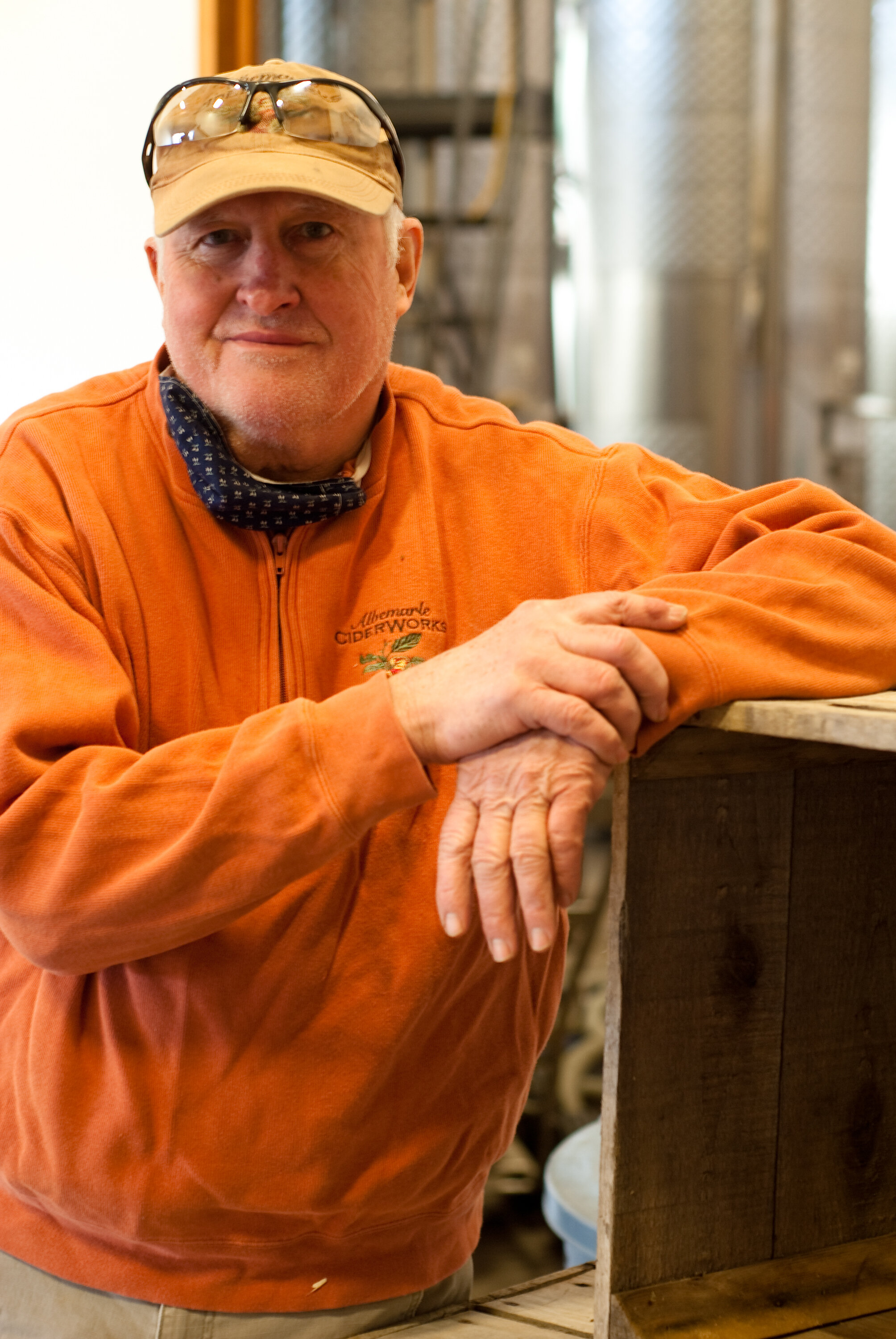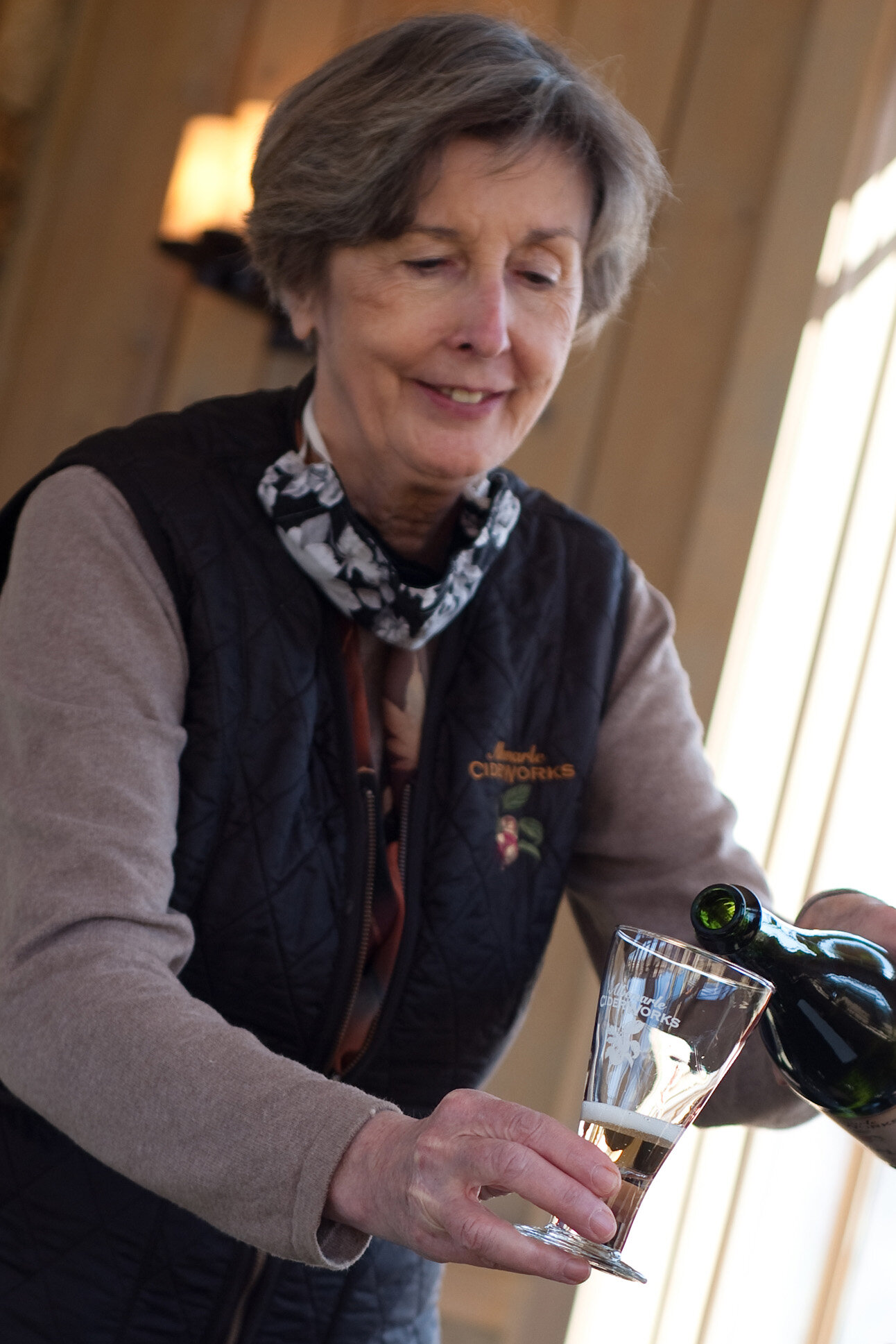These Roots Grow Deep — Albemarle CiderWorks, North Garden, Virginia
Cider has deep roots in Virginia, as does the Shelton family of Albemarle Ciderworks. Nestled in the rolling hills of the Virginia Piedmont, about 10 miles southwest of Charlottesville, the Shelton’s have spent the last 35 years breathing new life to apple growing and cider production in Virginia, and in turn, throughout the United States.
Photography by Mark Stewart
The Charlottesville area is cosmopolitan, boasting many famous past residents, including former presidents Thomas Jefferson, James Madison, and James Monroe, along with entertainers such as Sissy Spacek. Today it’s an area that values traditional crafts and people-focused foodways, leading to a decent proportion of well-educated palates. It’s the perfect audience for the Sheltons’ vision of cider that is anything but overly sweet, alcoholic apple juice.
On a bright, beautiful winter day I drove down Route 29 to the bustling orchard, cidery, and taproom that’s also the home of Charlotte Shelton. Albemarle Ciderworks is very much a family business with Charlotte, her brothers Chuck and Bill, and several other Shelton’s keeping the business running.
As the sun shone through the window of the most recent extension to the tasting room I joined her, and eventually Chuck—who’s also the head cidermaker—to discuss the origins of their cidery and its impact on Virginia’s nascent cider producers. I wanted to learn where they believe their cider stands within today’s drinks industry.
Charlotte’s career in cider began in 1986. Nearing retirement, her parents had purchased a small farm in Albemarle County and set to work building a house and creating a farm. Charlotte and her brothers all pitched in. Today the property spans some 140 acres and is home to all three siblings. In those early years, their father planted an orchard of apples, pears, and cherries—several of which, still bear fruit. The farm is named Rural Ridge Farm after the family seat—Rural Plains—as a nod to their family’s long history in Virginia going back to the early days of Jamestown in the 1660s.
Charlotte explains to me how her parents’ retirement project became probably the most significant cidery in Virginia. In the early 1990s, she started to add to her father’s orchard by collecting apple trees and working with Tom Burford, a forceful advocate for the preservation of heirloom apple varieties throughout the USA. It was from Tom that she bought an additional 10 trees for the orchard, and then another 50. Having sourced both heirloom and modern varieties, the orchard now boasts over 250 apple varieties.
What to do though, with several hundred apple trees at the turn of the 21st century in a country where “cider” had come to mean freshly pressed, but distinctly non-alcoholic, apple juice? In the early 2000s, under the name Virginia Vintage Apples, they did some small-scale fruit sales, ran grafting workshops with Tom, and in line with expectations at the time, pressed some of their crop to sell as fresh “cider.” Looking back on the early years of the orchard, Charlotte admits “at the very least I expected to have some elegant firewood”.
““At the very least I expected to have some elegant firewood.””
When Chuck joins us our discussion turns away from the history of Albemarle Ciderworks to the present: to apples, trees, and anything pomology. In the years before formally setting up the cidery, Chuck had spent as much free time as he could at Rural Ridge, travelling from his then home in North Carolina. Eventually, he decided he needed to be there full time, moving home to Virginia to join the family project.
Chuck had dabbled in homebrewing beer, so decided to try his hand at cider. At first he used a hand press to wring the juice from the fruit, and fermented in plastic buckets and carboys. With Chuck making drinkable “hard” cider (as the US market still calls it to differentiate it from the soft drink of the same name,) what began as a hobby became a retirement project focused on one simple vision: “to bring to market a fine quality cider where the apple itself is the star,” according to Chuck.
In 2007 the Sheltons started building a tasting room and officially opened as Albemarle Ciderworks in July 2009. An opening address was given by then governor of Virginia (now US Senator) Tim Kaine. Theirs was the first “hard” cidery and tasting room in central Virginia, and what is today the oldest in the state. Of the 24 members of the Virginia Cider Association, at least 18 have been established in the years since Albemarle Ciderworks first opened its doors.
In their first year, the Sheltons offered three ciders: Jupiter’s Legacy, Ragged Mountain, and Royal Pippin. The first pair are blends of the many heirloom varieties grown in the orchard, while the third is an eponymous single varietal, made from Albemarle Pippins. In England the Albemarle Pippin was held in such high regard by Queen Victoria that she had their import tariffs waived, and at one point became the Victorian era’s most sought-after apple variety.
As our conversion carries on, bottles begin to appear. Pomme Mary is a cider dear to the hearts of the Sheltons, named for their mother, whose preference was for a less dry cider and is slightly back-sweetened. Harrison is a single variety cider, with Chuck quick to sing its praises.
“[Harrison] is the best cider apple in the world,” he says. “It has more tannins, more acid, and more sugar than other varieties.”
The third bottle was a slightly different version of Pomme Mary that had been allowed to ferment out drier than their mother would likely have approved of. Both Pomme Mary and Harrison took home gold medals at the 2021 Virginia Governor’s Cup. The highly regarded local wine competition included a separate cider category for the first time this year, indicating how popular locally-produced cider is becoming with the State’s wine enthusiasts.
““They’re the real deal, the whole package, and one of the best finds in cider I have come across.” ”
Such success in a competition like this is testament to Chuck’s view that cider is more at home in the world of wine than it is with beer, even claiming, tongue firmly in cheek, that “all wine is cider made with grapes.” Being located in a region long noted for its wineries, including Barboursville Vineyards (whose wines featured at the wedding of Prince William and Kate Middleton) it’s hardly surprising that they are keenly aware of the parallels.
“Albemarle Ciderworks is one of the top ten cideries a true cider head must visit,” Michelle McGrath, executive director of the American Cider Association (ASA) tells me. “This is due to the reverence they give their apples, and how they express themselves in their cider.”
The Shelton’s share a similar mindset to revered UK cidermaker Tom Oliver, in that they consider cider to be a “fine product.” In a similar way to what Tom has done in the UK, I believe they are setting the standard for what cider ought to be throughout the US. When I spoke to Tom and explained I felt the world needed to know about the Shelton’s, he responded enthusiastically.
“They are just the sort of cider makers that need talking about and more people need to know about,” he says as he explains how he was pincered by the family at the 2016 CiderCon held in Portland, Oregon. “They’re the real deal, the whole package, and one of the best finds in cider I have come across.”
Tom describes Albemarle’s ciders as having clarity, cleanness and a “real precision” which he loved. For him the use of the Harrison variety gives their ciders a stamp of individuality that is demonstrative of terroir and true “sense of place.” It’s worth remembering that without the efforts of Chuck Shelton and Tom Burford, the variety may never have been brought back into regular cider production at all.
“They’re relatively high acid, but I found theirs worked,” Tom adds. “I can’t say that for every heirloom cider in America”
The Shelton family continues to advocate for heirloom apples and makes them the star of their ciders—in particular, Harrison and the Virginia Hewes Crab. The latter forms the backbone of most Albemarle blends and makes a delightfully elegant single varietal cider. As well as their collection of vintage trees, they also grow newer varieties such as MonArk or GoldRush that have value for eating, as well as cider. Chuck was also keen to point out though that when it comes to cider, quality fruit is key.
“You can’t make squat with Fuji or Red Delicious,” he quips.





























